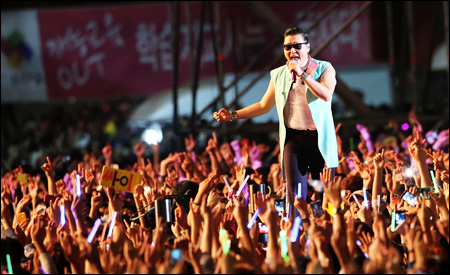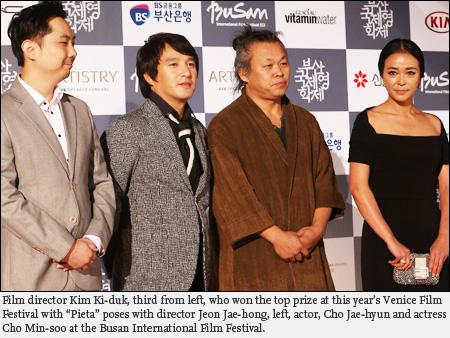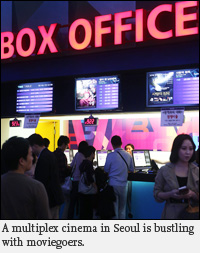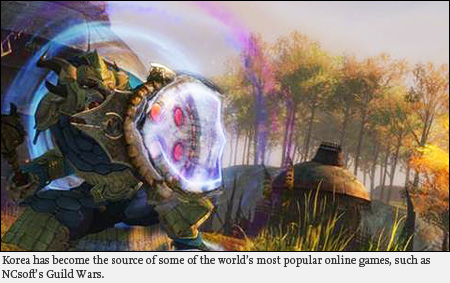
Seoul conference to discuss potential of Korea’s pop culture exports
Korea’s meteoric rise as an economic power has been driven by exports of televisions, mobile phones, cars and ships. It bears further watching as to whether soap operas, movies and music will prove to be the next big thing in the country’s expanding export lineup.
The Export-Import Bank of Korea (Korea Eximbank) is holding a conference today at the Shilla Hotel in Seoul on the prospects of Korea’s cultural and entertainment industries and their future place in the national economy.
The event, also backed by the Ministry of Culture, Sports and Tourism and the Korea Creative Content Agency (KCCA), aims to provide a platform for showbiz representatives, policymakers, financial industry people and scholars to share their ideas on finding the right models for supporting and financing Korea’s pop-cultural exports.
The conference, held between 10 a.m. to 1 p.m. at the hotel’s Yeongbingwan Hall, will bring together more than 180 public officials, businessmen and journalists, Korea Eximbank officials said.
Korea Eximbank CEO Kim Yong-hwan, Culture Minister Choi Gwang-shik and KCCA President Hong Sang-pyo will be present at the meeting, with the panel discussions led by bankers, policymakers, scholars and representatives from the music and television industries.
“The forum is basically about advancing discussions on how commercial lenders and other finance providers can assist the developers of Hallyu (Korean Wave) content and foster it into a full-blown industry,’’ said Park Chun-shik, the head of public relations at Korea Eximbank.
“There will be reports on the international consumption of Korean pop-cultural products, including analysis on the markets that seem strong, where and why they failed, and how the industry is contributing to overall exports. Korea Eximbank will also announce plans about financing culture and entertainment firms and discuss the future directions of our strategies. There will also be discussions about finding the right role models in designing these financial services for Hallyu firms.’’
It could be said that Korea continues to base its economic strategies on a template it made in the 1960s. That was when the military government of Park Chung-hee initiated an export-oriented industrialization strategy that produced a magnitude of change that took place over a more than a century in Western economies.
From textiles, construction, ships and steel to semiconductors, consumer electronics and mobile devices, Korea’s strength in the global economy has always been rooted in its manufacturing muscle and relatively cheap labor costs.
However, there is also a sense of insecurity about the future of the country’s economy, squeezed as it is between regional giants Japan and China.
China, the engine that drives global capitalism, has been duplicating Korea’s strength in manufacturing prowess and ruthlessly exploiting its advantages in labor costs.
This is an alarming development for Korean companies, which have yet to manage the technology jump to compete in the lucrative markets dominated by their German and Japanese rivals. The lack of entrepreneurship activity is also a problem for Korea, which is struggling to tackle unemployment and stagnant household incomes.
There is a feeling that the Korean economy will need more than just its corporate dynasties of Samsung, Hyundai and LG to establish a bankable foundation for the future.
It’s critical for the country to find new sources of growth and Korea Eximbank officials believe pop culture is a worthy candidate, considering the rising international acceptance of Korean movies, televisions shows, video games and music.
Korea’s pop music and television dramas have become immensely popular across Asia over the past decade, while films have been garnering a growing audience and critical acclaim. The country is home to some of the biggest online game companies in the world.
And then there is Psy, the Korean rap sensation who is now credited with a scorching Billboard hit and the current most popular dance craze.
Psy reached a new level of cultural significance during a National Football League (NFL) match when Cincinnati Bengals defensive tackle Domata Peko sacked Jacksonville Jaguars quarterback Blaine Gabbert and celebrated with a “Gangnam Style’’ dance. Defenders of the New York Giants’ Justin Pierre-Paul did the same after pinning down Washington Redskins’ quarterback Robert Griffin III.
In the conference, Yoo Jin-ryong, dean of the Hallyu Graduate School at the Catholic University of Korea, and Ko Jung-min, head of the Korea Creative Industry Research Institute, will deliver studies on the development of Korean pop culture as an industry and its potential for exports.
Kim Yoon-ji, a Korea Eximbank official, will present new ideas on developing more effective methods in the financing of culture and entertainment companies, while Myongji University professor Ban Ki-bum will make suggestions on government policies.









